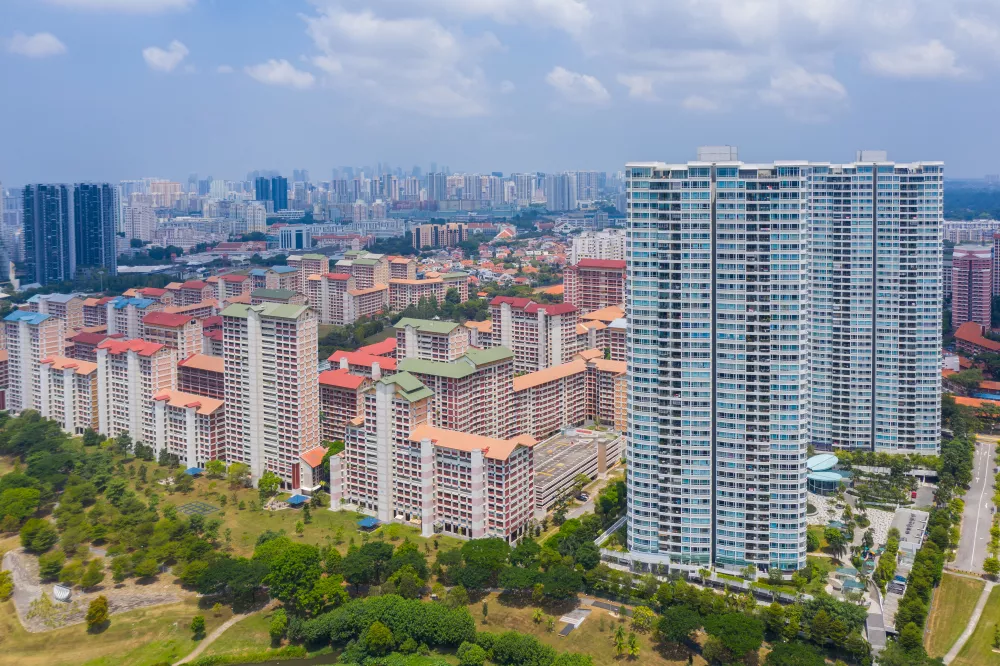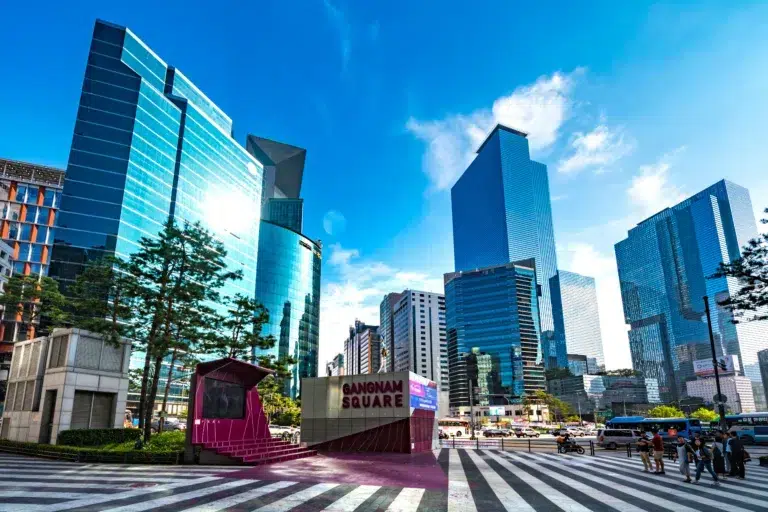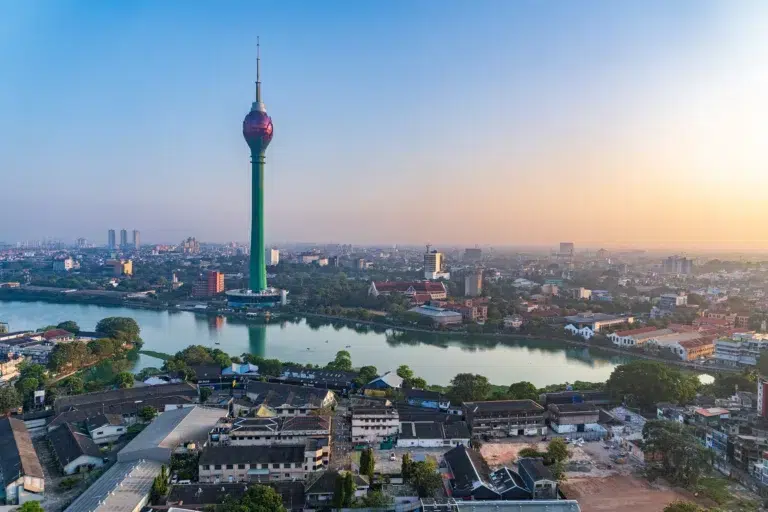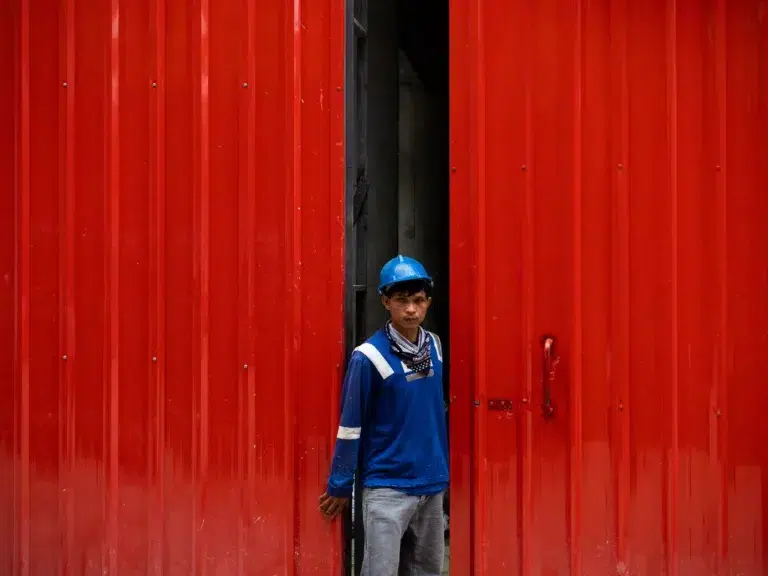Rethinking value in Singapore housing beyond the headline noise
Foreign levies, regional wars, and buyer fatigue are putting pressure on Singapore’s housing market — though suburban demand and long-term fundamentals offer hope

It wasn’t long after Donald Trump held up his oversized board of global tariffs in April that the ripple effects were felt in Singapore.
Almost overnight, home views dropped amid concerns that the US president’s 10 percent levy would slow the city-state’s economy.
“Market sentiment became cautious following Trump’s reciprocal tariffs announcement,” confirms Nai Jia Lee, head of Real Estate Intelligence at PropertyGuru Group.
Though the mood improved in May when Trump announced he would pause the tariffs for 90 days, Singapore’s housing market remains uncertain amid a slowdown since March and ongoing geopolitical tensions.
According to CBRE, 555 new units were launched in March compared to 1,694 in February. At the same time, private new home sales fell 54.4 percent month-on-month to 729 units. It was yet another swing in what has been months of fluctuations.
For the first nine months of 2024, the housing market sank to record lows due to government cooling measures, rising mortgage rates, and buyer fatigue after years of high prices.
But the market rebounded in the last quarter. Developer sales jumped threefold to 3,511 units from 1,160 units in the third quarter and exceeded the 3,049 units sold in the first nine months of the year.
The strong start to this year was driven by families and investors flocking to suburban projects for more affordable housing. Tighter loan rules and higher stamp duties implemented since March have made properties in the city centre less attractive.
Meanwhile, borrowing costs have dropped sharply, partly due to the Singapore dollar’s outperformance against most Asian currencies. The city’s currency is anchored to the Chinese renminbi, which has been kept stable by the People’s Bank of China in the face of China’s trade war with the US.
That allowed buyers to opt for larger homes in the suburbs.
“Unlike before, three- and four-bedroom units are selling quickly at high prices between USD3 million and USD4 million,” adds Nai Jia Lee. “Additionally, the secondary market has fewer listings compared to last year, resulting in higher prices and slower transactions.”
A new trend of flipping homes also contributed to this year’s early rush. With house prices rising year after year in Singapore’s private housing market, sub-sales have become fashionable.
This is when people sell homes bought at new project launches before the units are completed. Last year, about 1,300 such transactions for condos and other private apartments were officially recorded—the highest annual number in more than a decade.

Sales of new private units likely surpassed 3,200 in the first quarter, according to estimates from realtor Huttons Asia— the highest for that period since 2021.
But that momentum dissipated in March, according to Alan Cheong, executive director of research at Savills Singapore.
“Until March the take-up had been 80 to 90 percent for new launches,” he says. “So the market seemed pretty strong until the number of new launches slowed when Trump announced the tariffs.”
In April, developers sold 663 units, even fewer than the 729 sold in March.
Further fuelling anxiety about the future of the economy and house prices are the wars in the Middle East and the threat that Iran might close the Strait of Hormuz—through which a fifth of the world’s oil flows—in retaliation for further American and Israeli attacks.
Both the Middle East conflict and Trump’s tariffs have the potential to drive up inflation, which has remained low until now.
“The market remains highly volatile due to international events,” adds Cheong. “Elevated tensions in the Middle East could lead to increased inflation and, consequently, higher interest rates. Additionally, we have observed such tensions escalate and de-escalate rapidly, contributing to significant market uncertainty. As most stakeholders prepare for adverse scenarios, it is anticipated that many will proceed with caution, while some may pursue opportunistic purchases or investments as a hedge against inflation.”
This could hit one of the most important customer segments of the housing market, says Roy Ling, CEO of FollowTrade, an investment platform.
This isn’t a market for gamblers or dreamers. It’s one for strategic thinkers — those who know that value is shifting, fundamentals rule, and market timing, plus patience, is everything
Residents who own Housing and Development Board flats and are looking to move into private property—typically a condominium—are “the lifeblood” of the outer and mid areas of Singapore, says Ling.
These buyers, dubbed HDB upgraders, are being squeezed by soaring price-to-income ratios of more than 14 times.
“They are running up against the limits of affordability. The upgrade dream is becoming more financially strained for many young Singaporeans,” he says.
Experts say Singapore still has good market fundamentals: low unsold inventory, low unemployment, and a reliable government. But affordability cannot be allowed to stretch further.

Speaking in April, Prime Minister Lawrence Wong said he would set up a task force to counter the impact of Trump’s tariffs, which would harm Singapore due to its heavy reliance on exports. The task force would support businesses with tax breaks, households with vouchers, and unemployed workers with a cash allowance.
“Singapore may or may not go into a recession this year, but I do not doubt that our growth will be significantly impacted,” he says.
Nai said there could be some upside with the tariffs—notably that the government may invest more in infrastructure to stimulate the economy and asking prices might become more reasonable amid stiffer competition.
“If the first half of 2025 has taught us anything,” says Ling, “it’s that Singapore’s residential market is in a contemplative, recalibrating phase. This isn’t a market for gamblers or dreamers. It’s one for strategic thinkers— those who know that value is shifting, fundamentals rule, and market timing, plus patience, is everything.”
The original version of this article appeared in PropertyGuru Property Report Magazine Issue No. 191 on issuu and Magzter. Write to our editors at [email protected].
Recommended
ARES Whitepaper Volume 4: Powering communities – The catalysts of urban evolution
Fresh perspectives on sustainability, lifestyle, and design shaping the future of real estate
ARES White Paper Volume 3: The era of adaptive reinvention
Pioneering sustainable and innovative practices in urban development
ARES White Paper Volume 2: Unravelling the power of data revolution in real estate
Insights on proptech, smart cities, and sustainable development
ARES Digital White Paper Volume 1: The fundamentals of responsible building
Green and climate heroes join forces to discuss how Asia Pacific can weather the current environmental crises and the looming effects of climate change







